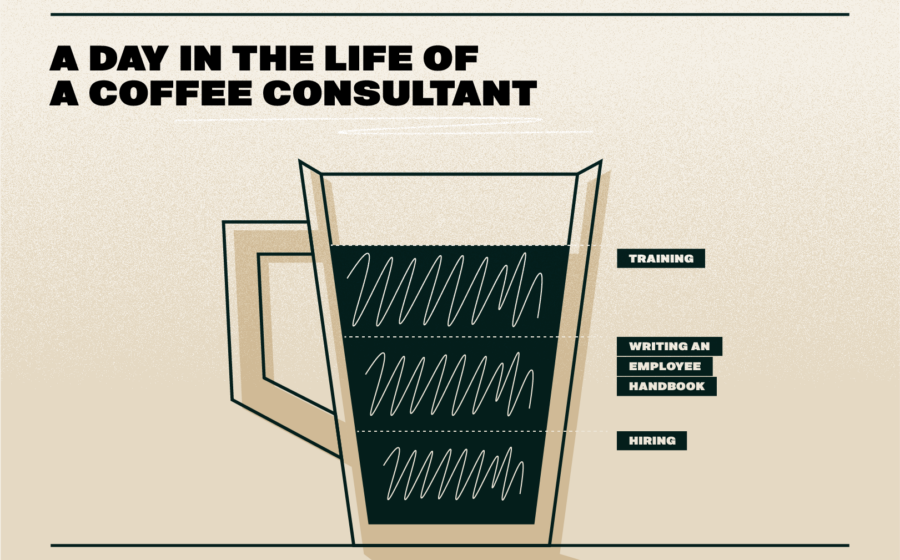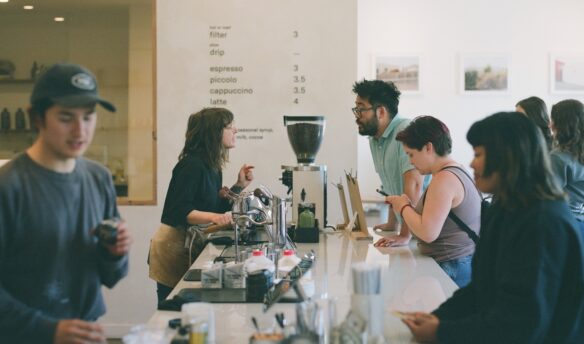Picture this: you are opening up a coffee shop. The location is picked, the espresso machine installed, and you’re nearly ready to open. It is a time of excitement, potential, and promise.
Then, the unexpected happens, and you run into an issue that’s more than just a bump in the road. Your counter is too tall, and the city says you can’t open until you fix it. You are looking at wholesale roasting partners and realize there are way more options than anticipated. You have a stack of resumes from job candidates but no one to train them.
In these moments, the stresses and hurdles that come with opening a coffee shop can feel lonely, but there are people who can help: coffee consultants. A coffee consultant can offer expertise to help cafe owners open and maintain their shop and guide companies through launching new products and software. No matter the hiccup, there’s no problem that can’t be tackled with the help of the right consultant.
There’s A Consultant For That
The coffee world is massive, and there are coffee consultants who specialize in every facet of the industry, from opening new coffee shops to green buying to starting a roasting operation. Hiring a consultant is about finding someone to help fill in knowledge gaps.
For LaNisa Williams, a Los Angeles-based coffee consultant and owner of BaristaLifeLA, consulting is about assisting retail coffee shops in building successful systems. “The process of opening up a coffee shop or a pop-up does take a lot of work, time, and effort,” says Williams, “but my goal is to make it as simple and achievable as possible.” In the past, Williams has worked with corporations like Starbucks and Peet’s Coffee and also runs her own pop-up, Hustler’s Cup Cafe.
She had originally posted a full-time job, but things had gotten busy … so I reached back out and said, ‘Hey, what about a retainer?’ And she was like, ‘Great, perfect, let’s go.’
Rachel apple
Most of Williams’ days involve visiting clients, who might be at various stages of opening or operating their coffee businesses, and helping them identify their goals for their coffee program. She gives wide-ranging insights, from assisting clients in developing plans for how they plan to train staff to advising on building codes and regulations. She employs experts on her team to consult on interior design decisions and make layout suggestions for shops.
While some consultants work on the retail end, consultants like Rachel Apple tackle the complexities and logistics of quality control and sourcing green coffee. Apple is currently on retainer with CropConex, a green coffee chain and logistics software company based in Ethiopia. “I had been talking to Brianna from CropConex,” says Apple. “She had originally posted a full-time job, but things had gotten busy … so I reached back out and said, ‘Hey, what about a retainer?’ And she was like, ‘Great, perfect, let’s go.’”
Apple has a background in green coffee buying and joined the CropConex team early in the company’s journey, working with their head of product and engineering team to make the software more accessible to buyers of green coffee. Now, her work has shifted, and she mainly consults on the company’s marketing strategy.
Being on retainer, meaning a client pays a set amount for regular access to a consultant’s time, provides Apple with stability and the freedom to bring on clients as her schedule demands fluctuate.
No Average Days
Many consultants are independent contractors, working outside the bounds of traditional offices and 9-5 structures. For coffee consultants, one day could be spent working at home answering emails and hopping on calls; another can be spent traveling to shops and businesses to meet with clients.
LaChrista McArthur, a consultant from Charlotte, North Carolina, has traveled ten times this year for work-related and industry gatherings. McArthur is a regular fixture at events like the Specialty Coffee Expo, an annual coffee trade show, or Coffee Fest, a series of trade shows held around the United States, where she connects with potential clients on “how to speak to the coffee market, whether it be consumers or the coffee professionals,” she says. For McArthur, this involves working with clients to set up booths at events that speak to their target audience and guiding them on how to present their brand and products to coffee people.
Coffee consulting is not for the weak. It is stressful, but the reward of it outweighs the stress by 110%. LaNisa Williams
McArthur has been a coffee professional for over a decade and uses her intimate knowledge of the industry to help clients utilize the language of coffee people. “[When] I got my first job on the corporate side of coffee, I realized that I was really good at integrating things from the coffee world to the corporate side. Once I left that job … I started consulting.”
Consulting might sound like a fancy and formal task, but if you’re offering insights that businesses can use to be more profitable or sustainable, then you’re consulting. McArthur says she’s been providing valuable feedback for shop owners long before she realized what she was doing was consulting. “You have to learn from someone or see it happen somewhere else, or someone has to tell you what you’re doing [is consulting],” she says. “For me, being a Black woman in coffee, I had no one telling me like, ‘Oh, you’re consulting and you should charge for that.’”
The word ‘consulting’ might not be as scary as it sounds, but being a consultant is still a grind. “Coffee consulting is not for the weak,” says Williams. “It is stressful, but the reward of it outweighs the stress by 110%.”
Apple, who started her consulting business after being laid off in 2022, describes the process as “building a plane mid-flight.” While the perks of consulting—the freedom to create your own schedule, not having a boss, the travel opportunities—may be appealing to some, coffee consulting comes with many of the stresses of freelancing—unpredictable work schedules, no consistent sources of income, and relying on the ebbs and flows of work coming in.
Filling In The Gaps
Businesses that invest in coffee consultants can gain access to information and insights from people with first-hand knowledge, which can be incredibly valuable for first-time business owners. “There’s an idea of what coffee looks like versus what it actually is,” says McArthur.
McArthur also consults on signature beverage training, a skill she honed running Hello Love …, a pop-up she used to run. She says she saw a gap between the creativity and intentionality given the cocktail world versus coffee. “[I’m] really good at distinguishing flavors and tastes,” she says. “So, I was like, ‘Well, why don’t I do that with cocktails and make them with coffee.”
Williams has become the go-to coffee consultant in Los Angeles for people looking to open up shops. It can be difficult, she says, to see owners battle roadblocks along the path toward opening a new space, and she knows that a small error or overlooked detail can be both frustrating and costly. For Williams, hiring a consultant helps avoid those hurdles: “We know the small things that will prevent you from moving to the next step.”
But it’s not just about knowing city codes or deciding on the right espresso machine to buy—coffee consulting is also about building fair and equitable systems in your workplace.
One of the conversations that Williams has with clients is the importance of hiring Black and Brown people and including them in decision-making processes. “That was the biggest problem when I worked behind the bar,” says Williams, reflecting on her own experiences working in coffee shops. “There was no one that looked like me, and so [my bosses didn’t] understand where I’m coming from. I don’t want sympathy, but I need you to understand how people talk to you versus how they talk to me.”
McArthur encourages companies to question their diversity initiatives and recognize that what they say on paper needs to translate into actionable plans. “If there’s one thing that people should get from me, it’s that if you want your company to look like the general public and be diverse, it’s going to be uncomfortable,” she says. “If your company is not diverse in any way, what are you going to do to change that?”
She helps companies foster conversations and question their Diversity, Equity, and Inclusion policies. Saying you welcome diversity, for example, usually looks like passive messaging—maybe a line “all are welcome to apply” on a job posting—but rarely tackles tangible action, like what a business will do to intentionally hire for diversity.
The coffee industry is constantly growing and changing. No matter where you turn, people are opening new shops, designing innovative products, and crafting delicious drinks—and, increasingly, a lot of this is thanks to the work of consultants. Consultants can help you develop sustainable systems and workflows, and their expertise can prevent roadblocks and hiccups on your path to opening a space or starting a coffee business. Rather than niche, the work of consultants can be a vital tool to help not just bring your vision to life but to help it thrive.















